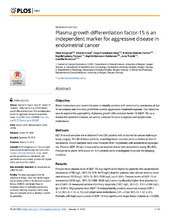| dc.contributor.author | Engerud, Hilde Renate | en_US |
| dc.contributor.author | Hope, Kirsten Øvergaard | en_US |
| dc.contributor.author | Berg, Hege Fredriksen | en_US |
| dc.contributor.author | Fasmer, Kristine Eldevik | en_US |
| dc.contributor.author | Tangen, Ingvild Løberg | en_US |
| dc.contributor.author | Haldorsen, Ingfrid S. | en_US |
| dc.contributor.author | Trovik, Jone | en_US |
| dc.contributor.author | Krakstad, Camilla | en_US |
| dc.date.accessioned | 2020-03-16T10:25:16Z | |
| dc.date.available | 2020-03-16T10:25:16Z | |
| dc.date.issued | 2019 | |
| dc.Published | Engerud HRH, Hope KØ, Berg HF, Fasmer KE, Tangen IL, Haldorsen IS, Trovik J, Krakstad C. Plasma growth differentiation factor-15 is an independent marker for aggressive disease in endometrial cancer. PLOS ONE. 2019;14:e0210585 | eng |
| dc.identifier.issn | 1932-6203 | |
| dc.identifier.uri | https://hdl.handle.net/1956/21506 | |
| dc.description.abstract | Objective: Better biomarkers are needed in order to identify patients with endometrial carcinoma at risk of recurrence and who may profit from a more aggressive treatment regimen. Our objective was to explore the applicability of plasma growth differentiation factor 15 (GDF-15) as a marker for recurrent disease, as well as a marker for poor prognosis and lymph node metastases. Methods: EDTA-blood samples were obtained from 235 patients with endometrial cancer before primary surgery. For 36 of these patients, matching blood samples were collected at time of recurrence. Blood samples were also collected from 78 patients with endometrial hyperplasia. Plasma GDF-15 was measured by an enzyme-linked immunosorbent assay (ELISA). Preoperative pelvic MRI scans for 141 patients were investigated in parallel for imaging variables. Results: Preoperative plasma level of GDF-15 was significantly higher for patients who experienced recurrence (1780 ng/L; 95% CI; 518–9475 ng/L) than for patients who did not develop recurrent disease (1236 ng/L; 95% CI; 307–7030 ng/L) (p<0.001). Plasma levels of GDF-15 at recurrence (2818 ng/L, 95% CI 2088–3548 ng/L) were significantly higher than plasma levels of GDF-15 measured at time of primary diagnosis (1857 ng/L, 95% CI; 1317–2398 ng/L) (p = 0.001). High plasma level GDF-15 independently predicts recurrent disease (OR = 3.14; 95% CI 2.10–4.76) and lymph node metastases (OR = 2.64; 95% CI 1.52–4.61). Patients with high plasma level of GDF-15 had significantly larger tumor volume (p = 0.008). Conclusion: Elevated plasma level of GDF-15 is associated with aggressive disease and lymph node metastasis in endometrial carcinoma. GDF-15 may be helpful in indicating recurrent disease. | en_US |
| dc.language.iso | eng | eng |
| dc.publisher | PLOS | eng |
| dc.rights | Attribution CC BY | eng |
| dc.rights.uri | http://creativecommons.org/licenses/by/4.0 | eng |
| dc.title | Plasma growth differentiation factor-15 is an independent marker for aggressive disease in endometrial cancer | en_US |
| dc.type | Peer reviewed | |
| dc.type | Journal article | |
| dc.date.updated | 2019-12-06T09:45:38Z | |
| dc.description.version | publishedVersion | en_US |
| dc.rights.holder | Copyright 2019 The Author(s) | |
| dc.identifier.doi | https://doi.org/10.1371/journal.pone.0210585 | |
| dc.identifier.cristin | 1693211 | |
| dc.source.journal | PLoS ONE | |
| dc.relation.project | Kreftforeningen: 190202 | |
| dc.relation.project | Norges forskningsråd: 273280 | |

